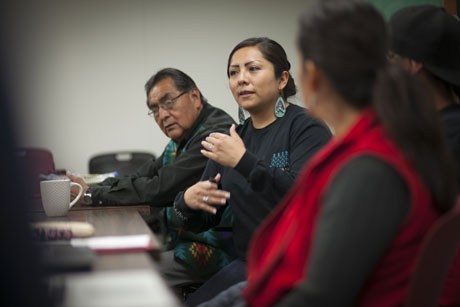Course connects students with Hopi community
By Krisy Gashler

When Angela Gonzales, associate professor of development sociology, was tasked with teaching her department’s new senior capstone course this spring, she had two primary learning outcomes in mind: a culminating experience where students could apply the knowledge, theories and methods they’d learned as development sociology majors, and real-world service to a community in need.
The course Gonzales developed connects her 15 students with nonprofit organizations on the Hopi Reservation in northeastern Arizona, to work collaboratively on projects that address community needs. Hopi community partners have kept in contact via WebEx and email, and several came to campus March 24-27 to meet the students face to face.
“Conditions students might find in underdeveloped countries can be found on many Indian reservations in the U.S.,” said Gonzales, a member of the Hopi Tribe. “I wanted to find a way to support community organizations in looking into problems or issues that limited resources and manpower prevent them from addressing.”
As the only federally recognized Indian tribe in Arizona without a casino, the Hopi maintain strong cultural traditions and practices, including sumi’nangwa, a Hopi value of emphasizing collaboration and community service.
Joyce Hamilton, manager of the Hopi Special Diabetes Program, wanted help revising the tribe’s school wellness policies to make them more effective and reflective of Hopi needs.
“Having Cornell University tied to the work we’re doing will help us really delve into this, but it’ll also definitely strengthen our voice with the Hopi students,” Hamilton said.
Some of Gonzales’s students are working with the Hopi Education Endowment Fund (HEEF), which has provided more than $8 million to Hopi students for higher education scholarships since 2000. The Cornell students are developing an assessment plan to solicit input on educational priorities from the 7,000 tribal members living on the 1.5 million-acre reservation.
“This has been a great learning experience for both the students and ourselves,” said HEEF staff member Sam Tenakhongva. “They are providing perspectives on our work that we often do not consider, which will definitely help to support the work of the HEEF.”
Other students are working with the Natwani Coalition, an organization dedicated to improving the Hopi food system and community health. The coalition works on multiple projects to promote local farming, including overseeing an Heirloom Seed Initiative to preserve traditional corn varieties.
“The partnership with Cornell students has helped me, as a one-person staff, to gather and organize information to strengthen our community-based programs,” said program manager Samantha Honani Antone.
The Cornell students are helping Antone develop strategies to strengthen outreach and discussion with the Hopi community, such as a website, radio shows and community workshops.
Working directly with community organizations has provided Cornell students with real-world experience applying the methods of development sociology and has helped them learn to be resourceful in resolving challenges. During an early WebEx meeting between students in Ithaca and a community partner in Arizona, for instance, the groups ran into a problem: The Hopi partner could see the Cornell students, but couldn’t hear their questions.
“I was worried about the technology; if something goes wrong, what are we going to do?” Gonzales said. “But one of the students just jumped in and used the chat feature to type student comments, and we were back on track. It was one of those wonderful moments when you appreciate students’ initiative and problem-solving ability.”
Krisy Gashler is a freelance writer for the College of Agriculture and Life Sciences.
Media Contact
Get Cornell news delivered right to your inbox.
Subscribe